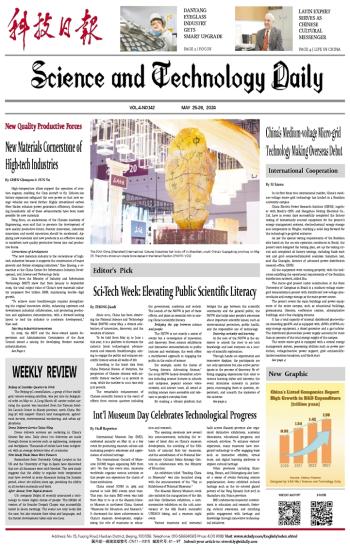
 Danyang Eyeglass Industry Gets Smart Upgrade
Danyang Eyeglass Industry Gets Smart Upgrade Latin Expert Serves as Chinese Cultural Messenger
Latin Expert Serves as Chinese Cultural Messenger China's Medium-voltage Micro-grid Technology Making Overseas Debut
China's Medium-voltage Micro-grid Technology Making Overseas Debut PHOTO NEWS
PHOTO NEWS New Materials Cornerstone of High-tech Industries
New Materials Cornerstone of High-tech Industries Sci-Tech Week: Elevating Public Scientific Literacy
Sci-Tech Week: Elevating Public Scientific Literacy WEEKLY REVIEW
WEEKLY REVIEW New Graphic
New Graphic Int'l Museum Day Celebrates Technological Progress
Int'l Museum Day Celebrates Technological Progress
High-temperature alloys support the operation of aviation engines, enabling the C919 aircraft to fly. Lithium-ion battery separators safeguard the core power so that new energy vehicles can travel farther. Highly streamlined carbon fiber blades enhance power generation efficiency, illuminating households. All of these advancements have been made possible by new materials.
Peng Shou, an academician of the Chinese Academy of Engineering, once said that to promote the development of new quality productive forces, frontier innovation, industrial innovation and model innovation should be accelerated. Applying new materials and new products is an effective means to transform new quality productive forces into real productive forces.
Cornerstone of development
"The new materials industry is the cornerstone of high-tech industries because it supports the construction of major projects and fosters emerging industries," Xiao Jinsong, a researcher at the China Center for Information Industry Development, told Science and Technology Daily.
Data from the Ministry of Industry and Information Technology (MIIT) show that from January to September 2023, the total output value of China's new materials industry surpassed five trillion RMB, maintaining double-digit growth.
"To achieve more breakthroughs requires strengthening the original innovation ability, enhancing upstream and downstream industrial collaboration, and promoting production and application demonstration, with a forward-looking layout to lead the industry to accelerate development," Xiao said.
Injecting industrial momentum
In 2023, the MIIT and the State-owned Assets Supervision and Administration Commission of the State Council issued a catalog for developing frontier material industrialization.
"Frontier materials represent the direction and trend of the development of the new materials industry. They can be applied in such fields as new-generation information technology, aerospace equipment, and high-end medical equipment," Huang Zaiman, president of Sinoma Science & Technology Co., said.
Currently, frontier materials are deeply integrated with AI. "The development of AI demands increasingly high computing power, and the core components of the information industry are shifting towards high frequency and speed, which requires the key glass fiber of matrix material to have low dielectric constant, low loss and low expansion," Huang said.
In addition, the application of new materials in the carbon sector is also becoming a new economic growth engine, and non-fossil raw materials and materials preparation technologies continue to emerge. "The R&D, design, production, application and recycling highly stress green concepts, which pushes the boundaries of material application, and drives the industry's high-quality development," Xiao added.
Room for improvement
"China's new material industry is transitioning to independent R&D of high-end products," said Huang, adding that there is room for improvement in the independent controllability of the industrial chain and original innovation ability.
Xiao said R&D, production and application should be stepped up around key industrial chains. Breakthroughs are expected in key equipment and core raw materials to enhance the industrial foundation.
The industrialization of sci-tech achievements in new materials is still in the exploration and testing stage. The R&D of materials and their application should be faster, Huang said.
"The central and local governments should encourage scientific research institutions and enterprises to establish innovation consortiums, while promoting the transformation of laboratory technologies into applications by strategic investment and participation fund," he added.
In addition, foreign enterprises and scientific research institutions should be welcomed to set up material R&D centers in China. Also, domestic standards and import and export policies in key areas of new materials should be improved to help domestic new material enterprises go global, Xiao said.

 Next
Next



